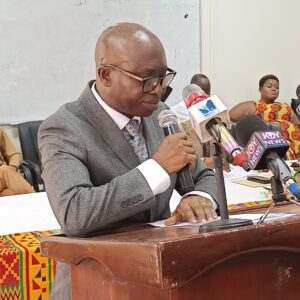Let’s prioritise geosciences research and data infrastructure to combat NCDs – VC

Professor Elvis Asare-Bediako, the Vice-Chancellor of the University of Energy and Natural Resources (UENR), has implored stakeholders to invest in geosciences research and data infrastructure to enhance efforts in combating Non-Communicable Diseases (NCDs) in Ghana.
He emphasized the role of geosciences in shaping a healthier and more sustainable future for the country.
Prof. Asare-Bediako, addressing the World Geoscientists and Geologists Day celebration organised by the University of Energy and Natural Resources campus at Dormaa-Ahenkro, in the Bono Region, stressed the need to influence geospatial technologies and embrace the transformative power of geosciences for sustainable development.
The event, under the theme “Geosciences, a Key Entity in Addressing Preventive Health in Ghana” was attended by students, health practitioners, geoscientists, traditional rulers and policy makers drawn from across the country
Prof. Asare-Bediako underscored the vital role of geosciences in providing valuable insights into climate change, water resource management, geological abnormalities and mineral exploration, which were essential for developing strategies for environmental conservation and resource utilization.
He mentioned that geosciences needed to be utilised as a catalyst for transformative change in advancement by propelling geosciences forward for development and empowering future generations to create a more resilient and prosperous world.
Prof. Asare-Bediako bemoaned the increasing prevalence of diseases such as cardiovascular illness, cancer, diabetes, hypertension and chronic respiratory disorders in the nation, posing a significant threat to public health and well-being of the citizenry.
He indicated that through meticulous geospatial analyses, areas with heightened risk exposure could be identified, allowing for targeted interventions to mitigate these hazards and to understand the impact of chronic changes on the spread of non-communicable diseases.
As global temperatures rise, Prof. Asare-Bediako said disease patterns were shifting and disease vectors were expanding into new territories and therefore by harnessing geospatial data and utilizing predictive modeling that could implement preventive measures to protect the population.
Mr. Crysler Akwei Ankrah, President of the Ghana Institute of Geoscientists, emphasized the importance of alliance between the fields of medical science and geology in conducting research to better understand various diseases and illnesses which were previously unknown and could not be identified.
As a geologist, Mr. Ankrah pointed out the significance of studying the composition of minerals in the soil to recognize those minerals that may have a detrimental impact on human health by combining geosciences expertise with medical knowledge, effective strategies to address health concerns.
He stressed the need for preventive measures to be implemented in areas where trace elements pose risk to human health, saying such collaborative approach would help mitigate the impact of these diseases and illnesses.
Source: GNA
